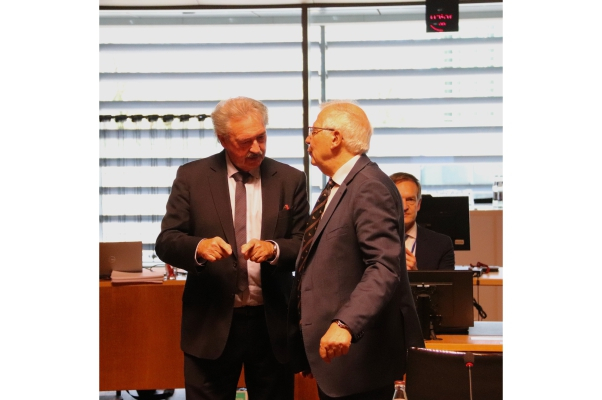 (L-R) Jean Asselborn, Minister of Foreign and European Affairs; Josep Borell, High Representative of the European Union for Foreign Affairs and Security Policy;
Credit: MAEE
(L-R) Jean Asselborn, Minister of Foreign and European Affairs; Josep Borell, High Representative of the European Union for Foreign Affairs and Security Policy;
Credit: MAEE
On Monday 11 April 2022, Luxembourg's Minister of Foreign and European Affairs, Jean Asselborn, took part in the Foreign Affairs Council of the European Union (EU), which was held in the European Convention Center Luxembourg (ECCL) in Luxembourg-Kirchberg.
EU foreign ministers mainly discussed the Russian military aggression against Ukraine, in particular with regard to the military and humanitarian situation in Ukraine, diplomatic coordination, negotiations for a ceasefire, sanctions and regional security. In this context, Minister Asselborn first wanted to express his condemnation of the horrific crimes committed by Russian forces in Ukraine. “Faced with the atrocities committed by the Russian army, it is important to hold responsible the perpetrators of violations of international humanitarian law. With this in mind, we fully support all ongoing efforts, and in particular the work of the International Criminal Court,” he noted.
Minister Asselborn underlined the importance of continuing to support Ukraine, both humanitarianly and militarily. In this context, he welcomed the third installment of EU aid under the European Peace Facility (EPF), which will thus be increased to €1.5 billion. This instrument is used to finance deliveries of military equipment to Ukraine. The minister reiterated the need for Russia to allow the evacuation of civilians and to respect humanitarian corridors, before welcoming the positive vote of the United Nations General Assembly on the resolution to suspend Russia's right to sit at the Human Rights Council.
Regarding Luxembourg's support for Ukraine, Minister Asselborn recalled that “Luxembourg has already welcomed more than 4,600 refugees and we are continuing to develop the capacities of our reception structures in order to continue contributing to the European effort. We have made humanitarian contributions of almost €3 million, provided satellite communication equipment and medical equipment, and weapons and defensive military equipment."
Minister Asselborn welcomed the adoption of a fifth package of sanctions which includes for the first time measures on energy, in particular coal: “We must ensure that the sanctions already decided are fully applied and that they are not circumvented. For this, we have to work with a certain number of third countries”.
In addition to Ukraine, a discussion on the "Global Gateway", a new European strategy aimed at developing smart, clean and safe links in the fields of digital, energy and transport and at strengthening health, education and research around the world, was also on the agenda. Luxembourg emphasised the relevance of this initiative as part of its response to the challenges that the EU is facing in the current geopolitical context.
During a working lunch, the ministers then exchanged views with their counterparts from Norway, Anniken Huitfeldt, and Iceland, Thórdís Kolbrún Reykfjörd Gylfadóttir. In the afternoon, the Council finally considered current European and international issues, including in particular relations with the Western Balkans, the latest developments in Mali and the situation in Libya.
Finally, during a brief discussion on EU support for Palestine, Minister Asselborn intervened, alongside a majority of other EU ministers, to recall the importance of releasing European funding for the Palestinian population. Josep Borrell, High Representative of the EU for Foreign Affairs and Security Policy, concluded by calling on the European Commission to take the necessary steps to enable the rapid disbursement of funds that support the Palestinian Authority and enable it to provide basic services to the population in need.








